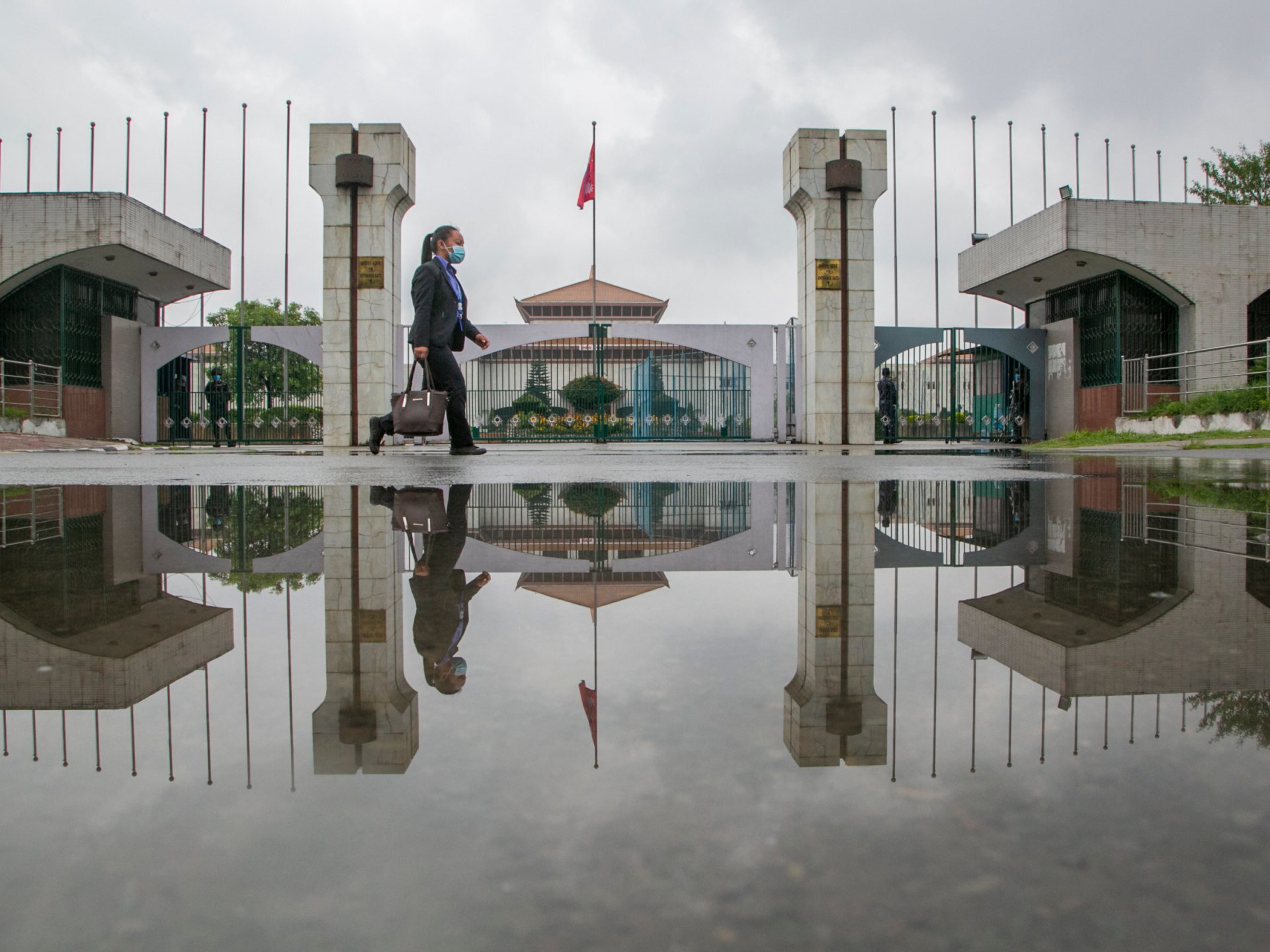World
Ex-Nepal ministers among 30 charged in US-bound refugee scam

Prosecutors say huge amounts of money were collected from hundreds of Nepalis to send them to the US as Bhutanese refugees.
Nepali prosecutors have charged 30 people, including two former cabinet ministers, with corruption in a case involving faking documents for Nepali nationals to enter the United States as Bhutanese refugees.
Former Home Minister Bal Krishna Khand, former Energy Minister Tope Bahadur Rayamajhi and former Home Secretary Tek Narayan Pandey, the most senior bureaucrat in the ministry, were among 16 people detained this month and charged.
Police are searching for 14 others who were charged in absentia.
Lakshman Upadhyay Ghimire, a spokesman for the district attorney’s office, said the accused are charged with “cheating, organised crime, document forgery and state offence”.
The case was registered at the Kathmandu District Court after police investigated allegations that they had collected large amount of money from hundreds of Nepali nationals promising to send them to the United States as Bhutanese refugees.
“If found guilty, they could be jailed for up to more than 15 years,” Ghimire told Reuters news agency.
The Kathmandu Post reported that those involved have allegedly “swindled around 875 Nepali nationals of millions of rupees”.
According to the Post, Rayamajhi has been suspended as a secretary of the Communist Party of Nepal (Unified Marxist-Leninist) party.
About 120,000 Bhutanese nationals of Nepali origin have been expelled or fled neighbouring Bhutan to Nepal since the early 1990s.
Nearly 113,000 of them have been resettled in several countries, including in the US, Canada and Australia, under a third-country resettlement programme after the two South Asian neighbours failed to repatriate them.
The US has taken about 100,000 refugees from Nepal. Several thousand are still living in camps in eastern Nepal, saying they want to go back to Bhutan.
It was not immediately clear if any Nepali nationals had been sent to the US as fake Bhutanese refugees.

World
Trump's FDA Pick Is Surgeon and Writer Martin Makary
World
Israel moves towards ceasefire deal with Hezbollah: reports

Israel is reportedly moving towards a ceasefire agreement with Hezbollah in Lebanon after nearly a year of fighting escalated into an all-out war in September.
Israeli media outlets including YNET and Haaretz have reported that Israel has tentatively agreed to a U.S.-backed proposal for a ceasefire. No final deal has been reached, according to the reports.
Journalists take pictures of a building hit direct by a rocket fired from Lebanon in Haifa, Israel, Sunday Nov. 24, 2024. (AP Photo/Francisco Seco)
Lebanon and the militia group Hezbollah reportedly agreed to the deal last week but both sides need to give the final okay before it can materialize.
The reported ceasefire deal comes after Hezbollah launched one of its largest rocket attacks on Israel in exchange for Israeli forces striking Hezbollah command centers in Beirut.
This is a developing story. Check back for updates.
World
Yamandu Orsi wins Uruguay’s run-off presidential election

Yamandu Orsi, the candidate for the left-wing Broad Front coalition, is projected to emerge victorious in Uruguay’s run-off election for the presidency.
He bested Alvaro Delgado of the ruling National Party to win the tightly fought race, though public opinion polls showed the two candidates in a dead heat in the lead-up to Sunday’s vote.
Orsi’s supporters took to the streets in the capital of Montevideo, as the official results started to show the former mayor and history teacher surging ahead.
Many waved the party banner: a red, blue and white striped flag with the initials FA for “Frente Amplio”, which translates to “Broad Front”.
“Joy will return for the majority,” the coalition posted on social media as Orsi approached victory. “Cheers, people of Uruguay.”
Orsi’s win restores the Broad Front to power in the small South American country, sandwiched on the Atlantic coast between Brazil and Argentina.
For 15 years, from 2005 to 2020, the Broad Front had held Uruguay’s executive office, with the presidencies of Jose Mujica and Tabare Vazquez, the latter of whom won two non-consecutive, five-year terms.
But that winning streak came to an end in the 2019 election, with the victory of current President Luis Lacalle Pou, who led a coalition of right-leaning parties.
Under Uruguay law, however, a president cannot run for consecutive terms. Lacalle Pou was therefore not a candidate in the 2024 race.
Running in his stead was Delgado, a former veterinarian and Congress member who served as a political appointee in Lacalle Pou’s government from 2020 to 2023.
Even before the official results were announced on Sunday, Delgado had conceded, acknowledging Orsi’s victory was imminent.
“Today, the Uruguayans have defined who will hold the presidency of the republic. And I want to send here, with all these actors of the coalition, a big hug and a greeting to Yamandu Orsi,” Delgado said in a speech as he clutched a large Uruguayan flag in his hand.
He called on his supporters to “respect the sovereign decisions” of the electorate, while striking a note of defiance.
“It’s one thing to lose an election, and another to be defeated. We are not defeated,” he said, pledging that his right-wing coalition was “here to stay”.
The outgoing president, Lacalle Pou, also reached out to Orsi to acknowledge the Broad Front’s victory.
“I called [Yamandu Orsi] to congratulate him as president-elect of our country and to put myself at his service and begin the transition as soon as I deem it pertinent,” Lacalle Pou wrote on social media.

Orsi had been considered the frontrunner in the lead-up to the first round of the elections.
Originally from Canelones, a coastal regional in the south of Uruguay, Orsi began his career locally as a history teacher, activist and secretary-general of the department’s government. In 2015, he successfully ran to be mayor of Canelones and won re-election in 2020.
In the 2024 presidential race, Orsi – like virtually all the candidates on the campaign trail – pledged to bolster Uruguay’s economy. He called for salary increases, particularly for low-wage workers, to grow their “purchasing power”.
He also called for greater early childhood education and employment programmes for young adults. According to a United Nations report earlier this year, nearly 25 percent of Uruguay’s children live in poverty.
But the economy was not the only issue at the forefront of voters’ minds. In a June survey from the communications firm Nomade, the largest share of respondents – 29 percent – identified “insecurity” as Uruguay’s “principal problem”.
That dwarfed the second-highest ranked topic: “Unemployment” was only picked by 15 percent of respondents.
As part of his platform, Orsi pledged to increase the police force and strengthen Uruguay’s borders, including through the installation of more security cameras.
As he campaigned, Orsi enjoyed the support of former President Mujica, a former rebel fighter who survived torture under Uruguay’s military dictatorship in the 1970s and ’80s.
Mujica remains a popular figure on Uruguay’s left, best known for his humble living arrangements that once earned him the moniker of the “world’s poorest president”.

In the first round of voting, on October 27, Orsi came out on top, with 44 percent of the vote to Delgado’s 27 percent. But his total was far short of the 50 percent he needed to win the election outright, thereby triggering a run-off.
The race got tighter from there forward. Only two candidates progressed to the run-off – Delgado and Orsi – and Delgado picked up support from voters who had backed former Colorado Party candidate Andres Ojeda, a fellow conservative who was knocked out in the first round.
Nevertheless, Orsi quickly pulled ahead after the polls closed for the run-off election on Sunday.
“The horizon is brightening,” Orsi said in his victory speech. “The country of freedom, equality and also fraternity triumphs once again.”
-

 Business1 week ago
Business1 week agoColumn: Molly White's message for journalists going freelance — be ready for the pitfalls
-

 Science5 days ago
Science5 days agoTrump nominates Dr. Oz to head Medicare and Medicaid and help take on 'illness industrial complex'
-

 Politics1 week ago
Politics1 week agoTrump taps FCC member Brendan Carr to lead agency: 'Warrior for Free Speech'
-
/cdn.vox-cdn.com/uploads/chorus_asset/file/25739950/247386_Elon_Musk_Open_AI_CVirginia.jpg)
/cdn.vox-cdn.com/uploads/chorus_asset/file/25739950/247386_Elon_Musk_Open_AI_CVirginia.jpg) Technology7 days ago
Technology7 days agoInside Elon Musk’s messy breakup with OpenAI
-

 Lifestyle1 week ago
Lifestyle1 week agoSome in the U.S. farm industry are alarmed by Trump's embrace of RFK Jr. and tariffs
-

 World1 week ago
World1 week agoProtesters in Slovakia rally against Robert Fico’s populist government
-

 News1 week ago
News1 week agoThey disagree about a lot, but these singers figure out how to stay in harmony
-

 News1 week ago
News1 week agoGaetz-gate: Navigating the President-elect's most baffling Cabinet pick















